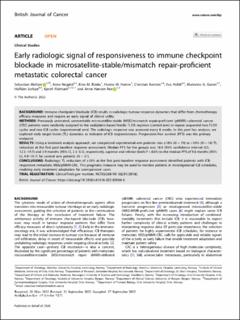Early radiologic signal of responsiveness to immune checkpoint blockade in microsatellite-stable/mismatch repair-proficient metastatic colorectal cancer
Meltzer, Sebastian; Negård, Anne; Bakke, Kine Mari; Hamre, Hanne Mari; Kersten, Christian; Hofsli, Eva; Guren, Marianne; Sorbye, Halfdan; Flatmark, Kjersti; Ree, Anne Hansen
Journal article, Peer reviewed
Published version

Åpne
Permanent lenke
https://hdl.handle.net/11250/3029719Utgivelsesdato
2022Metadata
Vis full innførselSamlinger
- Department of Clinical Science [2318]
- Registrations from Cristin [9791]
Sammendrag
Background: Immune checkpoint blockade (ICB) results in radiologic tumour response dynamics that differ from chemotherapy efficacy measures and require an early signal of clinical utility.
Methods: Previously untreated, unresectable microsatellite-stable (MSS)/mismatch repair-proficient (pMMR) colorectal cancer (CRC) patients were randomly assigned to the oxaliplatin-based Nordic FLOX regimen (control arm) or repeat sequential two FLOX cycles and two ICB cycles (experimental arm). The radiologic response was assessed every 8 weeks. In this post hoc analysis, we explored early target lesion (TL) dynamics as indicator of ICB responsiveness. Progression-free survival (PFS) was the primary endpoint.
Results: Using a landmark analysis approach, we categorised experimental-arm patients into ≥10% (N = 19) or <10% (N = 16) TL reduction at the first post-baseline response assessment. Median PFS for the groups was 16.0 (95% confidence interval (CI), 12.3–19.7) and 3.9 months (95% CI, 2.3–5.5), respectively, superior and inferior (both P < 0.01) to the median PFS of 9.8 months (95% CI, 4.9–14.7) for control arm patients (N = 31).
Conclusions: Radiologic TL reduction of ≥10% at the first post-baseline response assessment identified patients with ICB-responsive metastatic MSS/pMMR-CRC. This pragmatic measure may be used to monitor patients in investigational ICB schedules, enabling early treatment adaptation for unresponsive cases.
